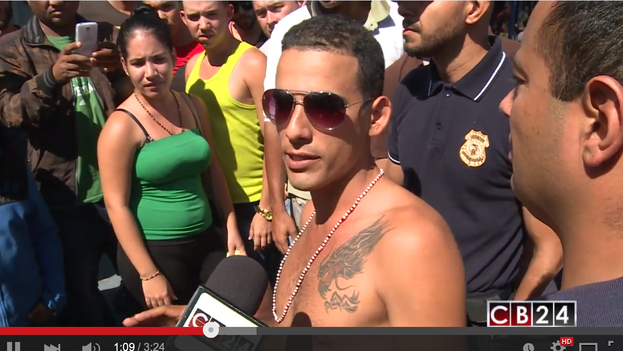
![]() 14ymedio, Havana, 13 November 2015 — Costa Rica on Wednesday closed its borders to Cubans who have no visa and announced that those who try to enter by land will be returned to Panama.
14ymedio, Havana, 13 November 2015 — Costa Rica on Wednesday closed its borders to Cubans who have no visa and announced that those who try to enter by land will be returned to Panama.
In an interview published Thursday in El Nuevo Herald, the Costa Rican Director of Migration, Kattia Rodríguez, said: “Costa Rica is cutting the chain at this time,” and confirmed that the order is to deport Cubans to Panama, which in turn refuses to receive them. More than a thousand Cubans at Paso Canoas, on the southern Costa Rican border, are in immigration limbo. “We are attributing to Panama this flow coming into Costa Rica from Panamanian soil, and it is mobilized by mafias of organized crime,” she said.
The Central American country is taking this step after seeing an exponential increase in the number of Cuban citizens who are transiting the country in order to continue their overland journey to the United States.
A report released Thursday by The Tico Times says that up to September, 12,166 Cubans had been arrested by the authorities of Costa Rica since early this year, which represents a 24,332% increase over the approximately 50 immigrants detained in 2011, according to figures from Immigration. In 2013, 2,549 Cubans entered Costa Rica without a visa, and in 2014 the number was 5,114.
Speaking to the TeleTica cameras, some Cubans trapped at the border criticized the measure, stressing that they are not interested “in the country, nor in its immigration laws.”
“We are in transit and we just want to get to the United States,” said one.
“We don’t want to stay here,” stressed another.
The network noted that the inhabitants along the southern Costa Rican border have complained about the measure, which has started to affect the flow of trade.
Cubans passing through the Central American countries usually come from Ecuador. Along the way, in some countries, such as Costa Rica, they were allowed to enter as refugees to travel to the capital to continue the process of regularization, which obviously they never continued because their objective was to reach the northern border. Honduras granted them humanitarian treatment to allow passage and Mexico gives them a safe conduct with a term of 20 days to leave the country.
